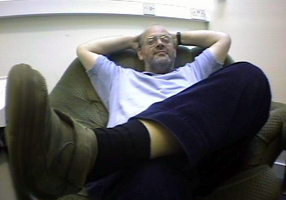Inman Harvey - Philosophy & Robotics
 In this episode we interview Inman Harvey who is researcher at the Center for Computational Neuroscience and Robotics at the University of Sussex and faculty of the Evolutionary and Adaptive Systems Group at the same university.
In this episode we interview Inman Harvey who is researcher at the Center for Computational Neuroscience and Robotics at the University of Sussex and faculty of the Evolutionary and Adaptive Systems Group at the same university.With his background in Philosophy and Robotics, he has been tackling fundamental questions on how not to design Good Old Fashion Artificial Intelligence and Robotics (GOFAIR), addressing issues such as the need for representation or embodiment. The final choice of how an autonomous robot is implemented, relies on the roboticists philosophical understanding of cognition. Because we all do Philosophy of Mind using a Screwdriver, two robots with the same purpose (i.e. bipedal walking) might end up being fundamentally different, (Asimo VS. Harvey's passive dynamic walker).
However, is it enough to have a robot which acts intelligently, or is the "The Juice" still missing (term coined by Rodney Brooks)? Stated otherwise, how can a robot achieve meaning in its world or the necessary motivation to survive? Finally, he presents artificial evolution as an approach to the design of complex systems following his own philosophy of the mind and defends it's potential to surpass GOFAI and answer the "juice question".
Another of Harvey's areas of interest not presented in this interview concerns Gaia theory and its applicability to robot control.
Links:


3 Comments:
Thank you! Very interesting
I agree with dennis
Me too. Nice post
Post a Comment
<< Home